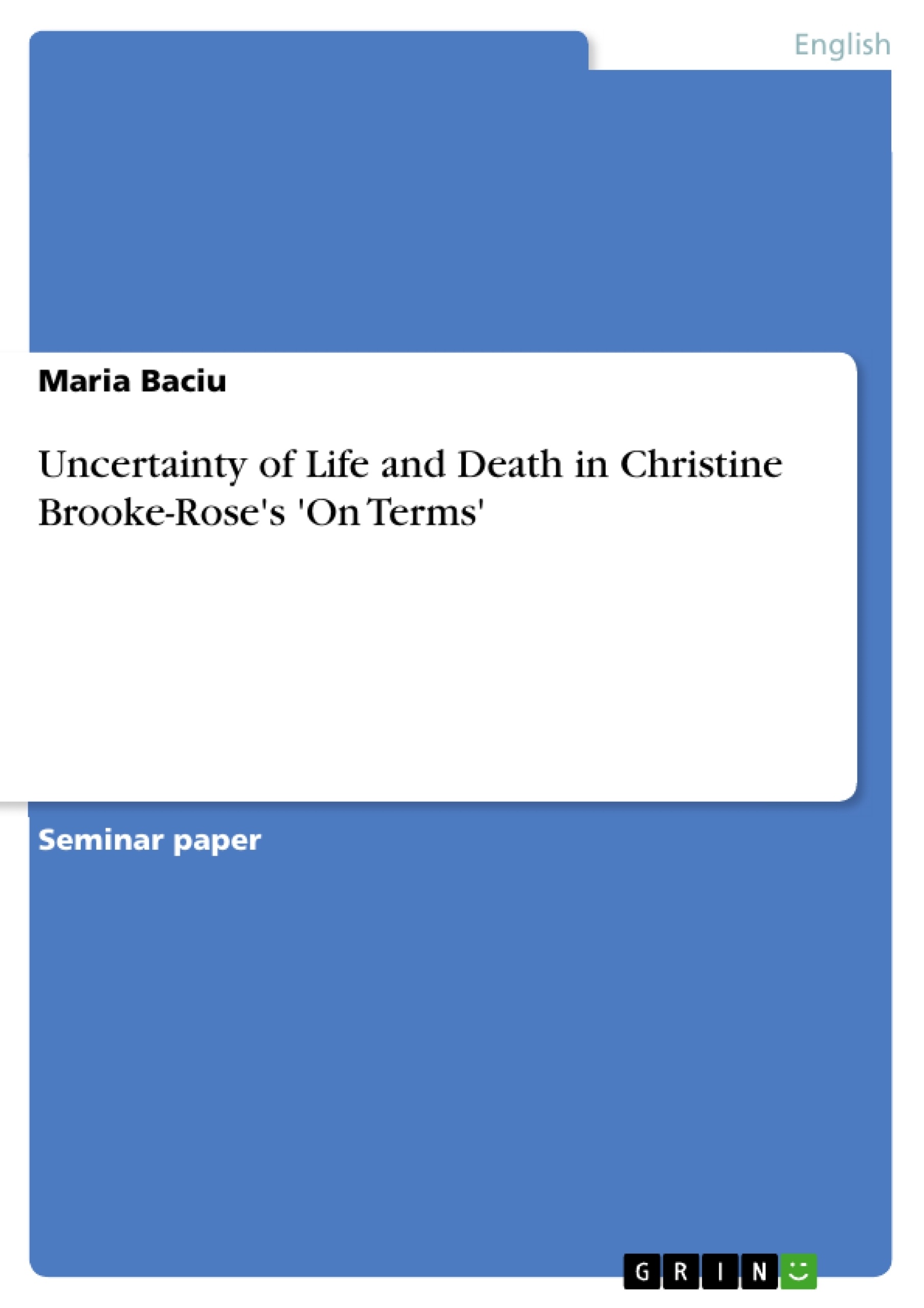A common practice among contemporary authors has been the exploitation and, concomitantly, the questioning of other fields of discourse than the literary one. This practice developed as an attempt to oppose nineteenth century Realism, defying thus the essential concept of truth of representation. This opposition can be observed especially in the unreliability of the characters as regards their vision or perception of the world. The involvement of a mediating consciousness or mediating language of the fictional character becomes thus responsible for altering the veridicity of the narration and for creating the so called suspension of disbelief.
The short story 'On Terms' written by Christine Brooke-Rose was published in the collection 'Go When You See the Green Man Walking' in 1970, and it is an experimentalist, ultra-modern piece of literature in structure, ideas and technique. Brooke-Rose has always managed to displace herself from any genre, any national tradition or literary context by using a highly innovative overlap of different fields of knowledge. This story features the discourse of astrophysics as an organizing metaphor of the surrounding world and of the character's identity.
The uncertainty that is cast upon the ontological status of the character, the difficulty of drawing a line between what is real (within the fictional world, of course) and what belongs to the imaginary, remains the reader.s responsibility concerning the text and the disclosure of its true message.
This paper will deal with the scientific discourse as an element fundamental to creating a semblance of truth, the language of astrophysics being the driving force that shapes the instability of the character's ontological status. Christine Brooke-Rose uses the paradoxes inherent in science to create a universe of instability which is strongly held together by the use of language. Not only the jargon of astrophysics but also various post-modernist narrative techniques serve here to stage a doubtful representation of truth and to illustrate the ambiguity of a character at a crossroads of life and death.
Inhaltsverzeichnis (Table of Contents)
- Introduction
- Body
- The Uncertainty
- The Uncertainty Principle in Science
- The Concept of Truth and its Alteration
- Representation of Life and Fragility of Existence
- Entre-deux: Suspended between Two Levels of Existence
- Experimental Style and Innovative Technique
- The Jargon of Astrophysics and the Break with Conventions
- The Uncertainty
- Conclusion
Zielsetzung und Themenschwerpunkte (Objectives and Key Themes)
This paper examines the use of scientific discourse, particularly astrophysics, in Christine Brooke-Rose's short story "On Terms," to explore the uncertainty of life and death, and to challenge the traditional concept of truth in representation. It aims to demonstrate how the story utilizes the inherent paradoxes of science to create a world of instability and ambiguity, while also questioning the role of language in shaping our understanding of reality.
- The Uncertainty Principle in Science and its Influence on Literature
- The Representation of Life and Death as Ambiguous and Intertwined
- The Use of Scientific Jargon and Post-Modernist Narrative Techniques
- The Role of Language in Shaping Reality and Perception
- The Challenges to Traditional Concepts of Truth and Representation
Zusammenfassung der Kapitel (Chapter Summaries)
The introduction establishes the context for Brooke-Rose's experimental approach, highlighting the challenge of traditional realism in the face of modern scientific discourse. It also sets the stage for analyzing the central themes of the story - uncertainty, ambiguity, and the blurring of boundaries between life and death.
The section on "The Uncertainty" delves into the scientific principles that inform the narrative, particularly the Uncertainty Principle formulated by Werner Heisenberg. It discusses how this concept contributes to the story's exploration of the limitations of language in describing reality and the resulting uncertainty surrounding the main character's ontological status. The chapter also explores Schrödinger's cat paradox and its relevance to the character's ambiguous existence, caught in a "pretence of life."
The chapter on "Representation of Life and Fragility of Existence" focuses on how Brooke-Rose uses the metaphor of the "entre-deux" to illustrate the character's suspended state between life and death. It analyzes the use of imagery and language to portray the character's physical decay and the paradoxical nature of their existence.
The final chapter on "Experimental Style and Innovative Technique" examines the techniques employed by Brooke-Rose in "On Terms" to challenge conventional narrative structures. It focuses on the use of astrophysical jargon and other postmodern elements to create a fragmented and ambiguous narrative, further illustrating the themes of uncertainty and the unreliability of representation.
Schlüsselwörter (Keywords)
The key themes explored in Brooke-Rose's "On Terms" include uncertainty, life and death, scientific discourse, astrophysics, truth and representation, language, postmodernism, experimental narrative techniques, and ambiguity. The story engages with scientific concepts like the Uncertainty Principle and Schrödinger's cat paradox to challenge traditional literary approaches and provide a unique perspective on the complexities of human existence.
- Citar trabajo
- Maria Baciu (Autor), 2014, Uncertainty of Life and Death in Christine Brooke-Rose's 'On Terms', Múnich, GRIN Verlag, https://www.grin.com/document/296177



